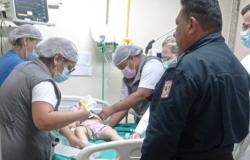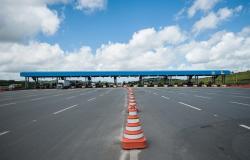Florianópolis, 02.04.2024 – Industries around the world have set goals that aim to reduce carbon emissions to zero. To accelerate the decarbonization of the sector in Santa Catarina, the Federation of Industries created the FIESC Decarbonization Hub, an unprecedented initiative that aims to mobilize the productive sectors, government, universities and research centers. The program will be presented this Wednesday, April 3rd, during Radar Reinvenção, a meeting held at the Federation’s headquarters, which will address the foundations and trends of neo-industrialization.
For the president of FIESC, Mario Cezar de Aguiar, the issue needs to be at the center of the industry and public authorities’ agenda. “Decarbonizing industry means reducing global greenhouse gas emissions, contributing to mitigating climate change. It is the transition to a more sustainable economy and we want to lead this process”, he highlights. “At the same time, sustainable production is increasingly an essential factor for competitiveness in the global market”, he adds.
Companies that invest in decarbonization often find opportunities for innovation, such as the development of new technologies and more efficient processes. It is also a strategy to comply with standards imposed by increasingly strict regulations related to carbon emissions.
Brazil is among the countries that made a commitment in the Paris Agreement to achieve carbon neutrality by 2050.
Activity themes
The hub organized by FIESC works to train people, research and develop new technologies for use on scale and new social models. The focus is to decarbonize production arrangements.
The first program is already being conducted in the animal protein chain, explains SENAI’s regional director, Fabrizio Machado Pereira. The challenge is to have 100% of pig waste being used to generate biogas in Santa Catarina within ten years. “It is a permanent agenda and new members are added to the groups according to their adherence to the theme. In addition, we will have work fronts in other chains such as coal, ceramics and plastic, textiles, among others, allowing decarbonization to reach different segments”, he details.
Another role of the hub is to direct actions that aim to measure greenhouse gas emissions, map renewable energy to guide investments in the state and assess the potential for generating carbon credits. Santa Catarina has great potential to operate in this market due to the possibilities of avoiding greenhouse gas (GHG) emissions, either by replacing fossil-based fuels with renewable ones, or by removing carbon dioxide (CO2) from the atmosphere through forest areas. natural or planted.
At the service of the industry
Among the solutions that SENAI already offers is the greenhouse gas (GHG) inventory that will measure emissions from industry in Santa Catarina. The survey is conducted by researchers from the SENAI Institute of Environmental Technology and companies of all sizes and sectors can participate for free by signing up until April 10th. Do you want to include your industry in the inventory? Click here.
Another initiative is the creation of the Santa Catarina Sustainable Energy Atlas. The work aims to map the potential for low-carbon energy generation in the state, such as hydrogen, from sources such as biomass, waste, coal, among others. Using the Atlas, it will be possible to prospect new investments in the sector, as well as position the state on the national scene. This work will be developed in partnership with the SENAI Institute for Innovation in Renewable Energies of Rio Grande do Norte, in line with the neo-industrialization concept of powershoring – which refers to the installation of industries in locations with high potential for renewable energy, such as wind, solar and biomass.
The SENAI network of institutes has also been working to help companies accelerate their adaptation to less polluting transport and energy sources. In addition to the conversion of combustion engines to electricity, the SENAI Institute of Technology in Electric Mobility and Renewable Energies, operating throughout the country, assists in more efficient energy management, the use of renewable sources and the insertion of industry in the free energy market. energy. The SENAI Institute for Innovation in Embedded Systems also participates in projects involving decarbonization.
There are opportunities to decarbonize the industry in energy consumption, fleet management, transport and distribution, employee transport, waste treatment, heat generation, refrigeration systems, business travel or offsetting its residual emissions, through the acquisition of carbon credits, for example.
Carbon market in Brazil
In December last year, the Chamber of Deputies approved a project (PL 2148/15) that regulates the carbon market in Brazil. The objective of the text is to create incentives to curb greenhouse gas emissions and reduce companies’ impacts on the climate. Other matters, such as the exploration of wind energy at sea (PL 11247/18) and the production of green hydrogen (PL 2308/23) depend on the approval of this project to move forward.
Carbon credit revenues could generate US$100 billion for Brazil by 2030, according to a study by the Brazilian representation of the International Chamber of Commerce (ICC Brazil).
Institutional Communication and Public Relations Management
Federation of Industries of the State of Santa Catarina – FIESC
Tags: FIESC presents hub accelerate decarbonization industry
--






